Hotel rooms might seem clean, but lurking germs, grime and other gross-out elements on high-touch surfaces could make your stay less than spotless
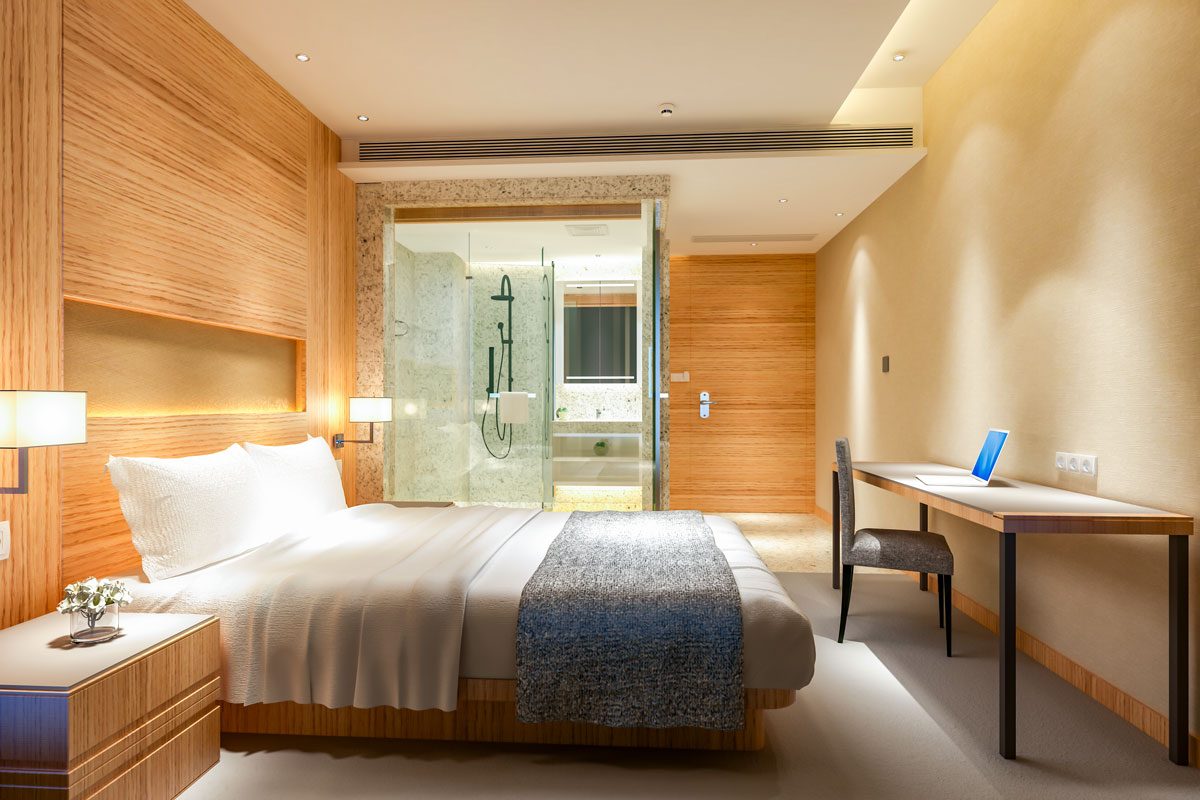
The 10 Dirtiest Spots in Every Hotel Room

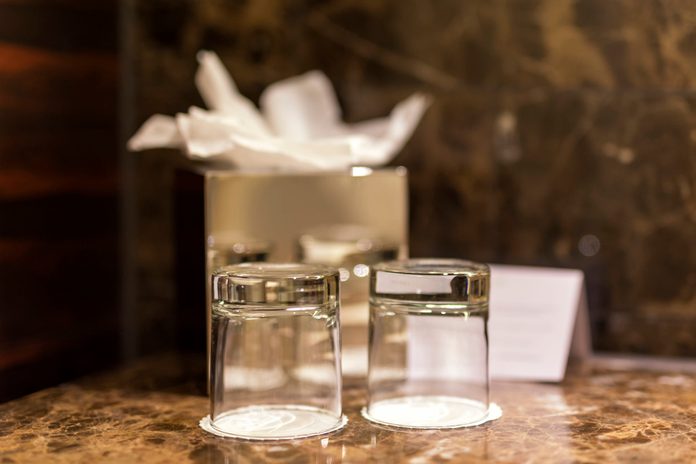
Glassware
Even with strict cleaning protocols, you can never be sure if those glasses in the bathroom or at the minibar have been properly washed. “The top thing I try to avoid using is typically any sort of reusable glassware just because it is possible a prior guest may have touched or used the glassware,” Dr. Long says. Worse, cleaning staff in some properties often just rinse the glasses in the bathroom and minibar with water if they don’t appear used. In order to be safe rather than sorry, it’s worth requesting individually wrapped disposable cups or bringing one of your own, such as an easy-to-pack collapsible one.
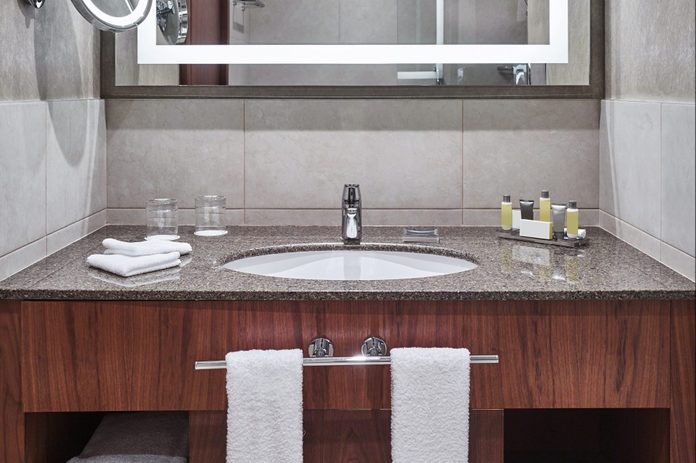
Bathroom counter and faucet
Germs tend to lurk on surfaces in poorly cleaned hotel rooms, particularly in the bathroom. One of the hot spots? The faucet. “The bathroom counter and faucets can sometimes be cleaned with the same cloth used to clean the toilet, which transfers germs from fecal matter onto the counter and faucets,” Dr. Stagg explains. Not only can this lead to gastrointestinal infections, but there may also be GI and respiratory viruses lingering on surfaces, she notes. Worse yet, the same cloths may be used from room to room. Dr. Long recommends keeping personal hygiene items, like a toothbrush or razor, in a kit brought from home rather than on the bare countertop.

Remote control
Some hotels claim that high-touch surfaces like TV remotes are thoroughly cleaned, but are they really? Post-Covid, many remotes are now often sealed to make them easier to sanitize, but Dr. Long advises washing your hands after using one. If the remote isn’t wrapped, you can minimize exposure to potential contaminants like E. coli left by previous hotel guests by placing it into a thin plastic bag (such as a Ziploc) to change channels and turn the TV off and on.
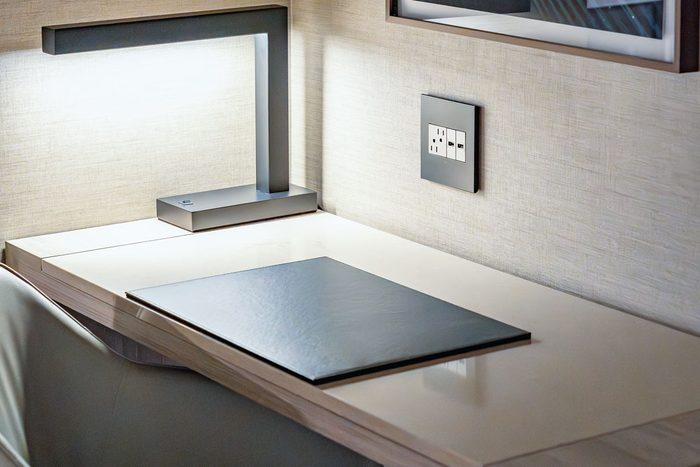
Desk
Desks are another frequently-used, high-touch surface that may not be cleaned regularly and are often places where guests and housekeeping might place dirty laundry. Fortunately, it doesn’t take much effort to wipe down the desk surface, just in case. Clean your work space well with a sanitizing wipe before setting down your laptop, papers, or—especially—using it to eat.
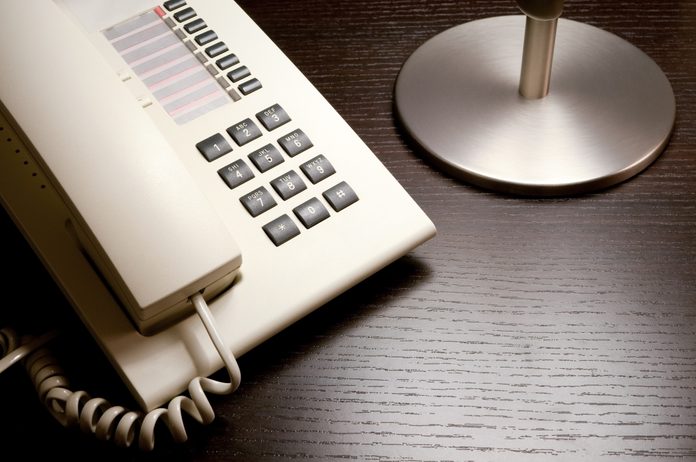
Phone
There’s one particularly icky place that will surprise absolutely no one: hotel room phones. They’re germ magnets since handsets are held close to the face and mouth. With the high risk of coming into contact with these gross-out factors, it’s best to skip using the room phone completely. But if you must, put it on speaker. “MRSA,” or methicillin-resistant Staphylococcus aureus, “has been found on phones and remotes, [and] can cause dangerous skin infections,” says Dr. Stagg. Phones can also harbor E. coli and respiratory viruses from previous guests speaking into or handling the handset.
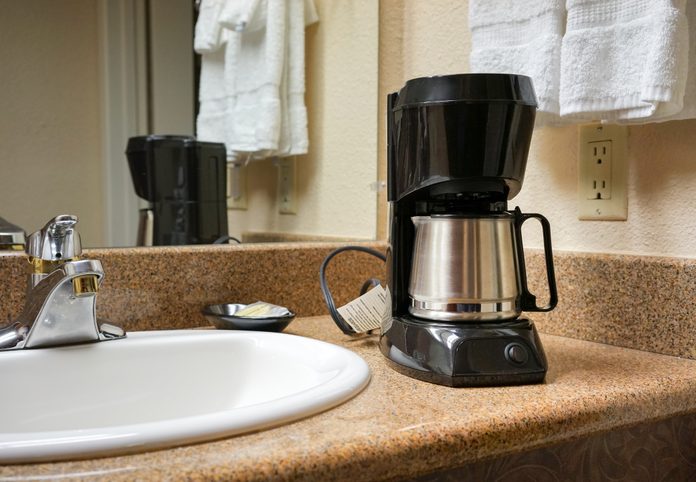
Coffee maker
Coffee makers can harbor mold and respiratory viruses, according to Dr. Stagg. In one study published in Scientific Reports, researchers at the University of Valencia found bacteria in nine Nespresso machines after just one year of use. If your room has a coffee maker, it’s often better to skip it and grab your morning cup of joe from the hotel lobby. If, however, you don’t want to leave your room and need that caffeine fix, Dr. Long recommends making sure the machine is the type that requires a single-use pod and only using a disposable cup. He also cautions that if the coffee maker contains an old pod or shows signs of mold inside, it’s safest to avoid using it and request a replacement unit from the hotel.
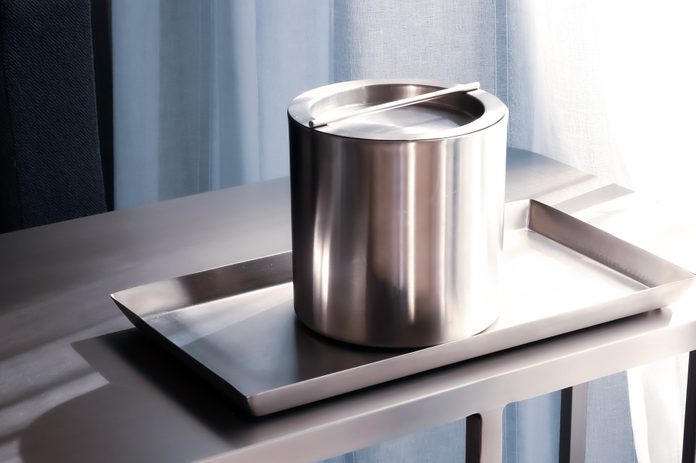
Ice buckets
Nope, not even your ice is safe! In fact, Dr. Stagg notes that hotel ice buckets can contain a host of germs, including norovirus from guests who may use it as a vomit basin (which happens more than you’d care to imagine). The outsides of buckets also may not be cleaned as well as you’d expect. But if you happen to find one in your room and want to use it, at least line it with a disposable bag insert.
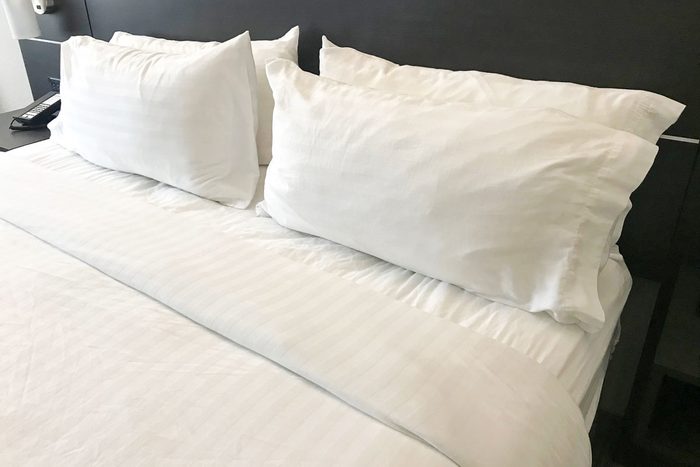
Comforter and pillows
The bed is arguably the most important item in any hotel room, so if it looks even slightly soiled, it’s a no-brainer to request new bedding before settling in. According to Dr. Stagg, unwashed sheets, blankets and pillowcases can harbor “organisms that cause sexually transmitted diseases.” Tip: to ensure you’re getting pristine pillowcases, she suggests to “always call housekeeping for extra clean pillowcases so you can change them yourself.” And if your bed has those decorative throw pillows? Remove them as soon as you arrive—they’re rarely cleaned and can harbor bacteria and allergens.
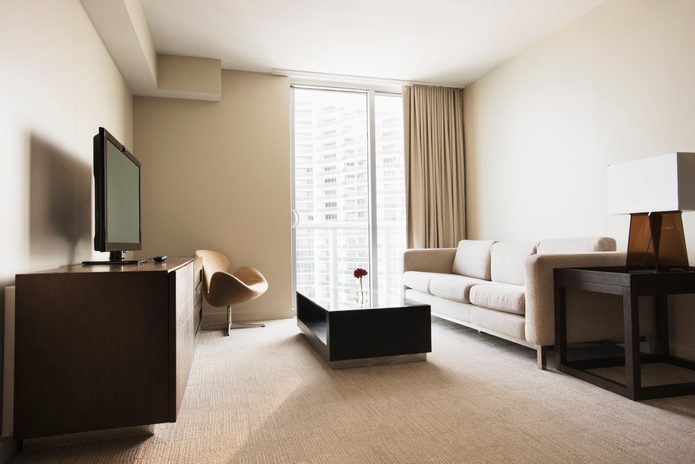
Sofa and chairs
“I think most people probably don’t think about all the surfaces that may be high touch but not cleaned or difficult to clean, like the chairs or upholstered furniture in a room,” Dr. Long points out. Unlike items that can be easily tossed in the washing machine, these seating staples can often go without regular upkeep. Stains from bodily fluids—which aren’t always visible to the naked eye—can harbor a variety of viruses and bacteria. “[Germs are] commonly found on fabric that is not easy to clean thoroughly,” adds Dr. Stagg. While some viruses may not survive as well on upholstered surfaces as on hard ones, you can get some extra peace of mind by spraying them down with Lysol.
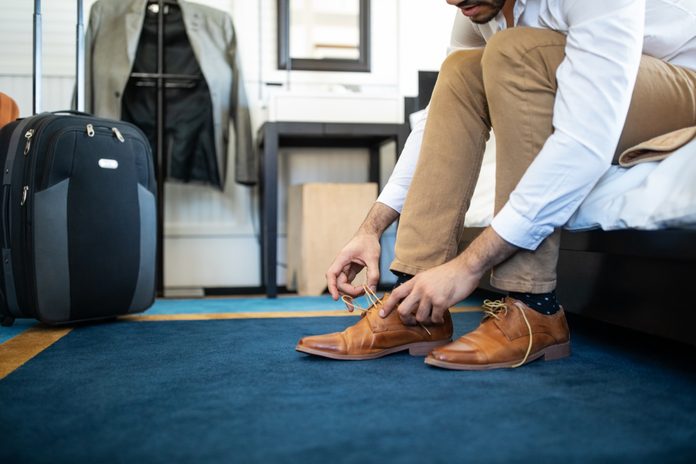
Carpets
Even if housekeeping diligently vacuums between guests (and let’s be honest, when was the last time you actually saw a vacuum in a hotel hallway?) the carpets are likely not actually deep-cleaned after each use. Plus, other nastiness could be tracked in on shoes and suitcase wheels from multiple guests. Carpets, because they are rarely deep-cleaned, can be breeding grounds for bacteria and germs. Health-conscious frequent travelers know to always wear socks or slippers in a hotel room and to avoid sitting down or laying on the carpet. When Dr. Long needs to work out or stretch on the floor of his hotel room, he puts down a large bath towel as a floor mat.
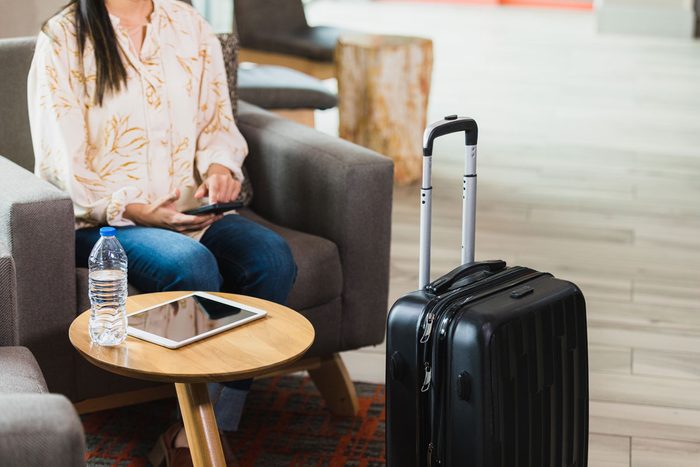
What should you do if your room is too dirty to stay in?
If you find yourself in a room that seems sketchy, Dr. Long suggests evaluating whether the overall hotel appears to be well-maintained before deciding whether to stay or switch accommodations. “I have been given keys to a room once that had obviously not been cleaned on accident,” he recalls of one incident. “The hotel was very apologetic and [arranged] a new room.” On another occasion, however, he arrived to a property that was in “deplorable condition,” with obvious environmental hazards that included broken plumbing. “I doubted any room in the hotel was clean or safe. In this case, I relocated to a different hotel.”
About the experts
|
Why trust us
Reader’s Digest has published hundreds of travel stories that help readers explore the world safely, easily and affordably. We regularly cover topics such as the best places to visit (and the best times to visit them), tips and tricks to zoom through airport security, flight-attendant secrets, hotel-room hacks and more. We’re committed to producing high-quality content by writers with expertise and experience in their field in consultation with relevant, qualified experts. We rely on reputable primary sources, including government and professional organizations and academic institutions as well as our writers’ personal experiences where appropriate. We verify all facts and data, back them with credible sourcing and revisit them over time to ensure they remain accurate and up to date. For this piece on airports with the longest wait times, Aaron Rasmussen tapped his experience as a longtime travel writer and frequent traveler to ensure that all information is accurate and offers the best possible advice to readers. Read more about our team, our contributors and our editorial policies.
Sources:
-
- Jennifer Stagg, MD, founder and medical director of Whole Health Wellness Center in Farmington, Conn and author of Unzip Your Genes: 5 Choices To Reveal A Radically Radiant You
- S. Wesley Long, MD, PhD, is the Medical Director of Diagnostic Microbiology at Houston Methodist
- Scientific Reports: The coffee-machine bacteriome: biodiversity and colonisation of the wasted coffee tray leach




















